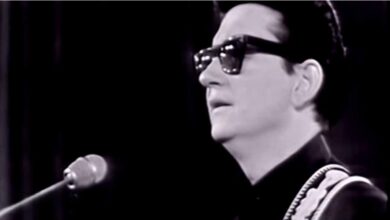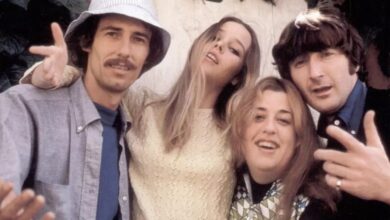Ritchie Valens’ ‘La Bamba’: The 1958 Classic That Continues to Unite Generations with Its Timeless Energy
In the vibrant tapestry of 1950s rock ‘n’ roll, few stories shine as brightly yet tragically as that of Ritchie Valens. Born Richard Steven Valenzuela on May 13, 1941, in Pacoima, California, Valens emerged as a pioneering figure in the Chicano rock movement, leaving an indelible mark on music history despite his brief career. His rendition of “La Bamba” not only showcased his unique talent but also bridged cultural divides, bringing a traditional Mexican folk song into the mainstream American music scene.
Growing up in a modest household, Valens was surrounded by the rich sounds of traditional Mexican music, which deeply influenced his musical sensibilities. By the age of five, he had developed a passion for music, teaching himself to play the guitar and other instruments. His natural talent was evident, and by his early teens, he was performing with local bands, captivating audiences with his dynamic presence and musical versatility.
In 1958, at just 17 years old, Valens was discovered by Bob Keane, the owner of Del-Fi Records. Impressed by the young musician’s talent, Keane signed him to a recording contract. It was during this time that Valens decided to shorten his surname to “Valens” to make it more radio-friendly, a common practice among artists seeking broader appeal in the mainstream market.
One of Valens’ most significant contributions to music was his adaptation of “La Bamba,” a traditional Mexican folk song from the state of Veracruz. Originally a dance tune, “La Bamba” had been a staple in Mexican culture for generations. Valens reimagined the song by infusing it with a rock ‘n’ roll flair, creating a fusion that was both innovative and respectful of its roots. This blend of traditional Mexican music with contemporary rock elements was groundbreaking and set the stage for future Latin rock artists.
Interestingly, despite his Mexican heritage, Valens grew up in an English-speaking household and was not fluent in Spanish. To perform “La Bamba,” he learned the lyrics phonetically, demonstrating his dedication to authentically presenting the song. This effort paid off, as his rendition resonated with a wide audience, transcending language barriers and cultural differences.
Released in 1958 as the B-side to “Donna,” a ballad Valens wrote for his high school sweetheart, “La Bamba” quickly gained popularity. The song’s infectious rhythm and Valens’ spirited vocals captivated listeners, propelling it onto the charts. It became one of the first Spanish-language songs to achieve significant success in the United States, highlighting Valens’ role as a trailblazer in the integration of Latin music into American rock.
Valens’ meteoric rise was a testament to his immense talent and the universal appeal of his music. He broke cultural barriers, becoming one of the first Latino artists to gain prominence in the predominantly Anglo-American rock scene. His success paved the way for future generations of Latino musicians, inspiring artists like Carlos Santana and Los Lobos, who have cited Valens as a significant influence on their work.
Tragically, Valens’ promising career was cut short on February 3, 1959, a date that would become known as “The Day the Music Died.” He perished in a plane crash alongside fellow musicians Buddy Holly and J.P. “The Big Bopper” Richardson. Valens was just 17 years old at the time of his death, leaving behind a legacy that, while brief, had a profound impact on the music world.
In the years following his untimely death, Valens’ music continued to influence and inspire. In 1987, the biographical film “La Bamba” was released, chronicling his life and career. Starring Lou Diamond Phillips as Valens, the film brought renewed attention to his contributions to music and introduced his story to a new generation. The movie’s success underscored the enduring appeal of Valens’ music and the timeless quality of “La Bamba.”
The song itself has seen numerous covers and adaptations over the years, most notably by Los Lobos, whose version for the “La Bamba” film soundtrack reached number one on the Billboard Hot 100 chart. This achievement highlighted the song’s lasting resonance and its ability to connect with audiences across different eras.
Valens’ pioneering efforts in blending cultural sounds have left an indelible mark on the music industry. He is often credited as the first Latino to successfully cross over into mainstream rock, a significant accomplishment during a time when the music industry was largely segregated along cultural lines. His work opened doors for future Latino artists, contributing to the rich diversity of the American music landscape.
Beyond his musical talents, Valens is remembered for his humble beginnings and the authenticity he brought to his work. He remained connected to his roots, often drawing inspiration from his cultural heritage and personal experiences. This authenticity resonated with fans and continues to endear him to new listeners discovering his music.
In recognition of his contributions, Valens was posthumously inducted into the Rock and Roll Hall of Fame in 2001. His recording of “La Bamba” has also been preserved in the National Recording Registry by the Library of Congress, cementing its status as a culturally and historically significant work. These honors reflect the lasting impact of Valens’ work and his role in shaping the course of rock ‘n’ roll history.
Today, “La Bamba” remains a beloved classic, celebrated for its vibrant energy and cultural significance. It stands as a testament to Valens’ innovative spirit and his ability to create music that transcends cultural boundaries. His legacy lives on, inspiring musicians and delighting audiences around the world.
Ritchie Valens’ story is a poignant reminder of the power of music to bridge cultures and bring people together. His brief yet impactful career serves as an enduring inspiration, illustrating how passion and talent can overcome barriers and leave a lasting legacy. Through



